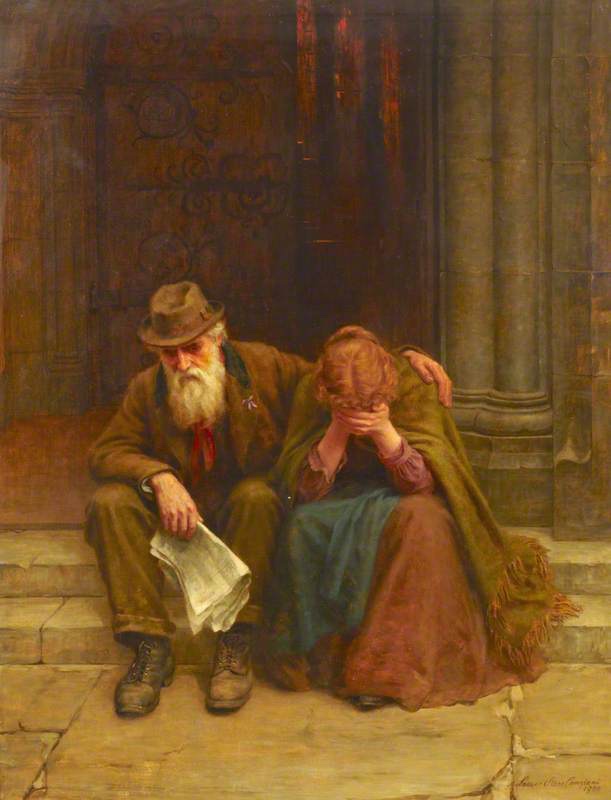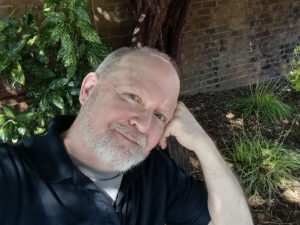New Year’s resolutions aren’t for me—the idea seems like a recipe for disappointment. But then in 2011, my daughter Jess opened her own shop in a small town three hours away from us. I resolved that year to visit her once a month (or more). It was the first annual resolution of my life. The trips were a joy. I frequently spent the night in a local hotel to draw out our time together. Thank God I did. Jess died four years later.
This year I’m trying another resolution. Jess’s grave is also three hours away. I don’t mind the drive, but as a COVID long-hauler, I must pick and choose my dates: her birthday, her memorial day, or other special occasions.
But my daughter also loved our local botanical gardens. We often went together when she was young. Our last date before she died was among those very flowers and trees. Even now I come across spots along the river or in its many paths and recall some dimly forgotten moment with her. While there, I treat myself to a sundae, one of her favorites. Today other visitors read Jess’s name on a memorial brick placed in the main walkway, across from the aquarium—and next to the ice cream stand.
This year I make a modest resolution. I will visit the gardens my daughter loved, stop by her brick, walk our paths, give myself time to mourn, and perhaps smile in gentle memory. Each trip is a gift of peace. My resolution is an act of hope.
You may know someone who lost a loved one last year. The next twelve months will likely be excruciating for them as the finality of death makes itself known in a hundred small ways. Still others are mourning a person that passed decades ago. They too face another year without their beloved. However long it has been, it can feel like no time at all.
For example, I once asked a bereaved mother, “How long since your son passed?” “Nine years.” “So, yesterday,” I said. She nodded in recognition: “Exactly.” I know the feeling. My daughter died on January 16, 2015. Ten years have slipped by yet there are days when the loss is as keen and terrible as if she had passed last week. Or moments ago.
“Real grief is not healed by time,” writes Henri Nouwen. “If time does anything, it deepens our grief.” This healthy aspect of sorrow is too seldom acknowledged in our society. “Love often makes itself visible in pain,” he says. “Consolation and comfort are to be found where our wounds hurt most.” Nouwen observes that as we get older, we feel more keenly what our dead meant to us and how intimately we feel their love in absence.
This sense of timelessness, of being out of sync with normal time, is well known to therapists and researchers. It may provide a glimpse into the nature of eternity itself. “The radical disruptions to time in grief might transform the mourner’s experience of time irreversibly,” suggests philosopher Emily Hughes with the University of York, “but in a way that enables a renewed connection to both their deceased loved one and the world from which they have become estranged.”
Hughes asks mourners if their experience of time has changed since their loss. The bereaved speak of a splintering or disconnect between their lived reality of time and the onward ticking of clocks. They continue to exist in the here and now but are simultaneously participating in the timeless time of their dead. Their perceptions of meaning, subjectivity, life, and death are altered in profound ways.
Most significantly, this newfound awareness allows mourners to maintain a relationship with their dead, even after many years. “For those enduring grief,” she concludes, “this thick conception of time enables timelessness and time, the living and the dead, past and present, to be folded back over one another such that they come to presence in their absence.”
Others also know the timelessness of grief. For instance, Rainer Maria Rilke’s first elegy, composed in January 1912 at Duino Castle, suggests that angels are beings of eternity whose very existence “acknowledges a higher level of reality in the invisible world.” They exist across an unbridgeable chasm, he writes, having completed a transformation from the visible to the invisible. The poet holds that this realm of angels can only be comprehended in death. Because of this, time weighs heavy on mortals, leading to doubt and anguish: “Who, if I cried aloud, would hear me among the angelic hosts?”
Rilke is in respectable company. Job, Jeremiah, and the psalmists also knew desperation and feelings of abandonment. “How may laments be answered at all?” asks Werner Hamacher with Johns Hopkins University. “How does one respond to a language that resists every answer?” As the years go by, as each special occasion or birthday passes without our loved ones near, we too may echo the keening of millennia: Does anyone hear our cries? And suppose they do. No amount of lament will return our loved ones from the grave.
Many mourners experience a spiritual crisis after a loss. Most express resentment and doubt toward God, according to researchers Laurie Burke and Robert Neimeyer with the University of Memphis. This reaction often leads to significant changes in belief, renewed spirituality, and a sense that our dead are mindful of us even as they continue in eternity. Perhaps Tennyson was onto something when he wrote in 1849: “There lives more faith in honest doubt, / Believe me, than in half the creeds.”
Harvard philosopher and theologian Paul Tillich agrees. “The doubt which is implicit in every act of faith is the doubt that accompanies every risk,” he explains. “Serious doubt is a confirmation of faith.” Questions do not negate belief. Rather, they play an important role in our interaction with an invisible world that so often seems just out of reach. Doubt demonstrates how seriously we take our relationship with God.
I struggle with these troubling questions each January as my daughter’s memorial day nears. Such reflections may be painful but also helpful, suggests psychologist Christopher Davis with the University of Michigan. His team discovered that mourners who find meaning in life feel less distress over the years.
When Jess died, my assumptions of security were ripped away, leaving acute feelings of frustration, anger, sadness, helplessness, terror, loneliness, despondency, and hurt. It is all too easy to direct these volatile reactions toward family members and friends. One counselor reports that he is often surprised to see mild-mannered people transformed by sorrow into raging, temperamental, and resentful individuals. But he is not alarmed. This too is part of grief, and love, and doubt, and faith, as George Herbert observes:
Bitter-Sweet Ah, my dear angry Lord, Since Thou dost love, yet strike, Cast down, yet help afford; Sure I will do the like. I will complain, yet praise, I will bewail, approve; And all my sour-sweet days I will lament, and love.
I too lament, and love, and am astonished that I do not give in to despair. Instead, I have a new appreciation of life’s transience and unexpected beauty: a hawk’s cry; sunset; a leaf; my wife’s smile. Time slips away as it must, but when I pause, precious moments can seem to last for hours.
Still, waves of mourning inevitably return. Grief comes and goes to the flow of an unknown and unknowable tide. In the face of this, with a new year before us, we may ask: Aren’t there things we’re supposed to do? Like stages or some such? No. There are not.
Grief is not a process to work through, a disorder to heal, a condition to treat, or an illness to cure.
Widely-respected researchers Margaret and Wolfgang Stroebe with the University of Groningen observe that grief deserves medical awareness, yes, but not in the way we might think. They list physical and psychological stressors that may have significant health consequences: decreased autoimmune function; nutritional problems; anxiety; and sleep disorders. Then they surprise us.
The Stroebes insist that while grief work may be an entrenched notion, there is little evidence that confronting aspects of loss is beneficial to the bereaved: “It is important to note that the so-called stage theory of grief should not be ‘prescribed’ to any bereaved person, since the approach is not valid on several counts and bereaved people can be harmed by thinking they should go through the stages.”
Another pioneer in grief therapy, Lorraine Hedtke with California State University, stresses the importance of an ongoing story of relationship. “Grief too becomes an evolving and creative opportunity for story development,” she says, “rather than an unpleasant task to be worked through as quickly as possible.” As we face another year, memories and stories help us to develop a helpful, positive connection with our dead.
Each time I facilitate a bereavement support group, we do not speak of healing or moving on. Instead, one idea dominates our discussions: Grief is love. Sorrow, like love, is part of us now. We love in absence and separation, true, but still we love. This thought is invariably met with a palpable sense of relief.
“Grief is a completely natural and healthy response to a death, and it should not be repressed,” observes author Johann Christoph Arnold, past elder of the Bruderhof Communities. “It is the soul’s expression of continuing love for that person.”
Now January is upon us. Time flows on while our grief, and our love, feels ever new. Is there any way we can show our love without succumbing to hopelessness?
We might try a New Year’s resolution that defies despair.
As I visit my daughter’s memorial brick and stroll in the gardens we so often shared, I realize that a decade after her death I still don’t know how to brave a new year of grief. Doubts remain; pain does not fade. But this quiet time offers a hint. We may choose to face each month in the same way that we mourn. With love for those we have lost, for those still with us, and for ourselves.
From a silver bloom of dawn emerges gold: the sun smiles on a world that looks up, smiling in return. Flowers open to its warmth: choirs of birdsong rise to greet it: a prayer of creation calls to the Creator’s ear. All life hopes anew and loves what was lost: a new day’s steady gaze warms what was frozen in the night. Prayers are heard: the golden gate is thrown open: unlock your heart, embrace life and the joy you find in it. — Friedrich Rückert, after the death of his two youngest children
The translation of Rückert’s poem is by David Bannon.
Image Via: The De Morgan Foundation





3 comments
Mel Livatino
Thank you, David. When you originally told me about your piece on FPR, I had not yet gotten that week’s issue. I know the territory you write of so well. My wife died shortly after your daughter died. I have written a book’s worth of essays about her and her loss. I have also written a book of poetry and also a journal book about her disappearance into Alzheimer’s, then into death. None are published. But each one is finished. In an e-mail to you I will send you the last poem in the book of poetry. It could easily speak for all of us who have lost a loved one. Mel Livatino
Christine
Thank you. I needed to read this today.
David Bannon
Thank you for telling me, Christine. May your thoughts and memories this coming year be gentle and forgiving.
Comments are closed.